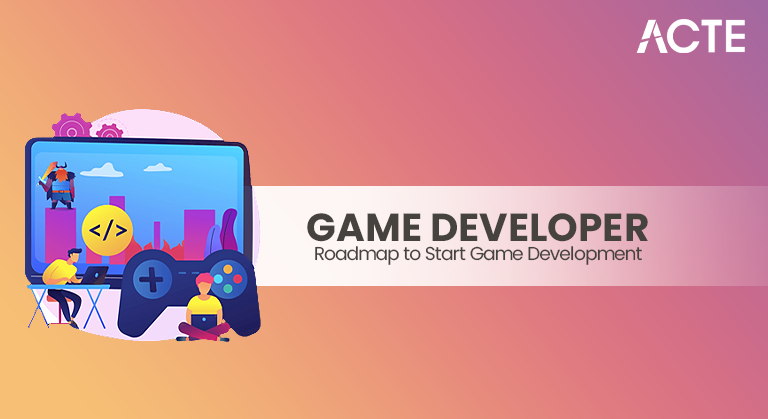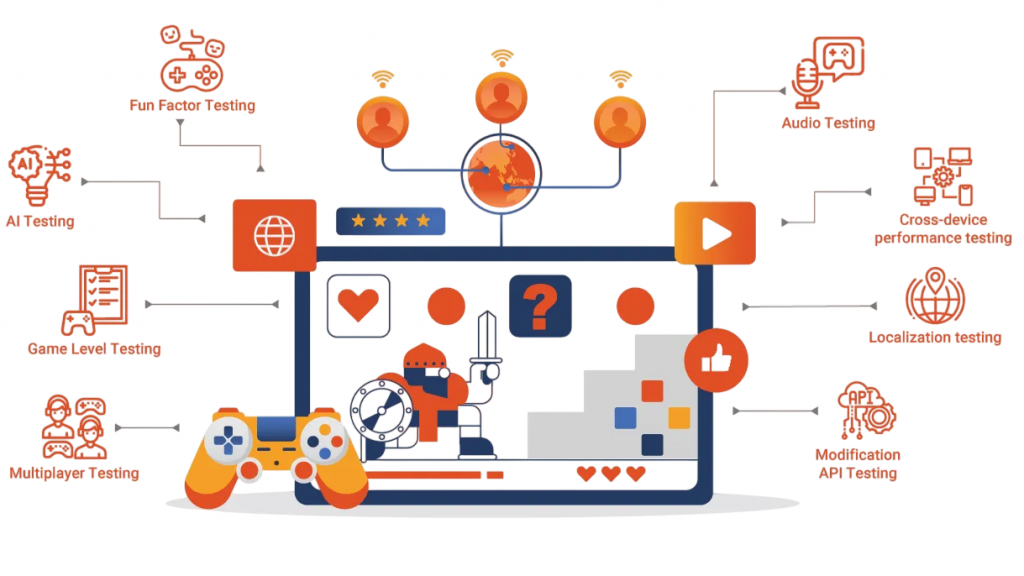
- Game Development
- Skills Required
- Choosing a Game Engine
- Programming Languages for Games
- Learning Game Design
- Creating a Game Portfolio
- Game Development Tools
- Publishing and Monetizing Games
- Indie vs Studio Roles
- Challenges in Game Development
- Certifications and Courses
- Career Path and Salaries
- Conclusion
Game Development
Game development is the art and science of creating video games for various platforms, including PCs, consoles, and mobile devices. It involves multiple disciplines such as programming, art, design, sound, testing, and production. With the gaming industry booming globally, it has become an attractive and rewarding career path for creative and tech-savvy individuals. To build scalable game engines or backend systems that support real-time multiplayer features, exploring Java Training reveals how mastering Java equips developers with the skills to create robust, cross-platform applications that power modern gaming experiences. Whether it’s crafting a simple mobile puzzle game or a complex AAA title, game development requires both technical and creative expertise.
To Earn Your Java Training Certification, Gain Insights From Leading Game Developer Experts And Advance Your Career With ACTE’s Java Training Today!
Skills Required
Becoming a successful game developer demands a unique blend of skills. Firstly, strong problem-solving abilities and logical thinking are crucial. You need to understand algorithms, game mechanics, and optimization techniques. Creativity is equally important, especially in designing game narratives, characters, levels, and gameplay experiences. Communication and teamwork are essential since game development is usually a collaborative effort involving designers, artists, programmers, and testers. To support this collaboration with the right tools and libraries, exploring What is pip reveals how Python’s package installer streamlines dependency management, enabling developers to integrate frameworks, assets, and utilities that enhance both functionality and creative expression. Lastly, a passion for gaming and the desire to constantly learn and evolve are traits that every aspiring game developer must possess.
Choosing a Game Engine
- One of the first technical decisions in game development is selecting a suitable game engine. Game engines are software frameworks that provide the tools and functionalities needed to build games. Popular engines include Unity, Unreal Engine, Godot, and CryEngine. Unity is widely used for both 2D and 3D games and is beginner-friendly.
- Unreal Engine is preferred for high-end graphics and complex gameplay. Godot is open-source and lightweight, ideal for indie developers. Your choice should depend on your project requirements, team size, platform targets, and personal learning curve.
- A game developer must be proficient in at least one programming language. C++ is a staple in the industry due to its performance and flexibility, especially in console and PC game development. C# is commonly used with Unity, making it an excellent choice for beginners.
- JavaScript is useful for web-based games, while Python is great for scripting and prototyping. Lua is used in many engines for gameplay scripting. Understanding object-oriented programming and memory management is essential regardless of the language you choose.
- Publishing a game involves releasing it on platforms like Steam, Google Play, Apple App Store, or consoles through publishers or independently. It requires understanding platform-specific requirements, marketing strategies, and monetization models.
- Monetizing games can be through ads, in-app purchases, subscriptions, or one-time purchases. Effective monetization balances profitability with user experience. Building a marketing plan that includes social media presence, trailers, websites, and community engagement is key to gaining visibility and success.
- Formal education isn’t always required, but certifications and structured courses can boost your skills and employability. Platforms like Coursera, Udemy, edX, and LinkedIn Learning offer game development courses. Universities also offer game design and computer science degrees with a focus on games.
- Certifications in Unity, Unreal Engine, or specific programming languages validate your expertise. Joining game development bootcamps or attending game jams can also provide practical experience and networking opportunities.
- To understand the foundation behind every digital tool and platform, exploring What is Software Explained reveals how software encompasses everything from operating systems and applications to embedded systems forming the backbone of modern game development and interactive experiences.
- Game development offers diverse career paths. Entry-level roles include QA tester, junior developer, or game design assistant. With experience, you can become a gameplay programmer, technical artist, or level designer. Senior roles include lead developer, art director, or project manager.
- Salaries vary based on role, location, experience, and company size. In general, game developers earn competitive salaries, with potential growth as the industry expands. Freelancing and indie development can also be lucrative with successful releases.
Would You Like to Know More About Java Training? Sign Up For Our Java Training Now!
Programming Languages for Games
Learning Game Design
Game design is a crucial component that goes beyond visuals and code. It involves creating compelling storylines, engaging gameplay mechanics, balanced difficulty levels, and immersive experiences.Learning game design can involve studying successful games, understanding player psychology, and learning about pacing, reward systems, and level design. To complement creative design with technical execution, exploring Java Training reveals how mastering Java equips developers to build scalable game logic, integrate backend systems, and develop cross-platform applications that bring interactive experiences to life. Books, online courses, and workshops are excellent resources. Tools like GameMaker, RPG Maker, and Construct can help beginners understand game design basics without deep coding knowledge.
Are You Interested in Learning More About Java Training? Sign Up For Our Java Training Today!
Creating a Game Portfolio
A strong game portfolio is vital for breaking into the game industry. Start by building simple games to demonstrate your skills. Include different genres and gameplay styles to showcase versatility. Document your role in each project whether you handled the coding, art, design, or sound. Host your games on platforms like Itch.io or GitHub and include videos or playable demos. To ensure your backend logic runs smoothly across different environments, exploring Node.js Installation on Windows and Ubuntu reveals how setting up Node.js properly enables consistent development, testing, and deployment workflows across operating systems. A portfolio helps employers and collaborators assess your abilities and dedication. It also shows your growth and learning trajectory over time.
Game Development Tools
Game development requires a variety of tools beyond game engines. For art and animation, tools like Adobe Photoshop, Illustrator, Blender, and Spine are widely used. Sound design often involves Audacity, FL Studio, or Ableton Live. Source control tools like Git are crucial for version tracking and collaboration.

IDEs like Visual Studio or Rider support programming. To sharpen your coding fundamentals within these environments, exploring How to Sort a String in Python reveals how simple string operations like sorting characters alphabetically can reinforce logic building, syntax fluency, and hands-on problem solving in Python. Project management tools such as Trello or Jira help teams stay organized. Familiarity with these tools enhances productivity and professional appeal.
Preparing for Java Job Interviews? Have a Look at Our Blog on Java Training Interview Questions and Answers To Ace Your Interview!
Publishing and Monetizing Games
Indie vs Studio Roles
Game developers can work independently (indie) or with established studios. Indie developers often wear multiple hats handling design, coding, art, and marketing. It offers creative freedom but comes with financial and resource constraints. Studio roles are more specialized, such as gameplay programmer, level designer, or sound engineer. Studios provide stability, team support, and access to advanced tools and infrastructure. To align your programming skills with these specialized roles, exploring Method Overriding in Java reveals how subclass behavior can be customized to meet specific gameplay or system requirements making your code more adaptable and role-specific in collaborative environments. Choosing between indie and studio roles depends on your career goals, risk tolerance, and preferred work style.
Challenges in Game Development
Game development is rewarding but comes with challenges. These include technical bugs, creative blocks, scope creep, deadline pressure, and team coordination issues. Balancing gameplay mechanics, ensuring cross-platform compatibility, and meeting player expectations are constant hurdles.

Moreover, the industry is competitive, requiring continuous skill upgrades. To build efficient systems that support these demands, exploring Data Structure Definition reveals how understanding arrays, stacks, queues, and trees enables developers to organize game logic, optimize performance, and deliver seamless user experiences. Time management, stress handling, and maintaining motivation are vital. Overcoming these challenges requires persistence, adaptability, and a proactive learning mindset.
Certifications and Courses
Career Path and Salaries
Conclusion
Becoming a game developer requires dedication, creativity, and continuous learning. It’s a career where passion for games meets technical skill and storytelling. By acquiring the right tools, building a strong portfolio, and staying current with industry trends, you can carve out a successful path in this exciting field. To strengthen your foundation in backend development and enterprise applications, exploring Java Training reveals how mastering Java opens doors to robust frameworks, scalable architectures, and high-demand career opportunities across industries. Whether you aim to join a renowned studio or launch your own indie title, the journey of a game developer is both challenging and deeply rewarding.





